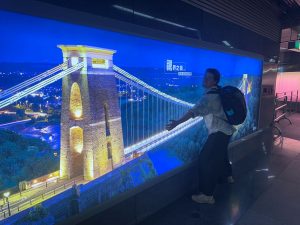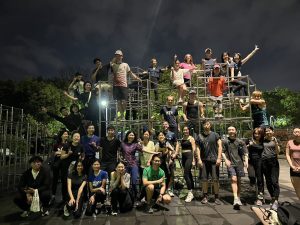我今天想要給你分享我的語言學員的課程。這個語言學院所安排的課程跟一般語源學院比起來,截然不同。

週三的跑步團樓梯活動
Wednesday running group’s stair exercise
在每個學期的第一天,學長要求大家在一個“語言承諾合同”簽名。所合同裡的承諾是在學院的環境,除了中文以外,承諾不會說任何其他語言。你一旦說另外一種語言,會被警告一次。要是超過三次你會被要求離開學校,也不能再來上課,學費也不會還給你,為的是保護沈浸式語言環境。我的語言學院不嚴格地執法這個規定,原因就是百分之百的學生都很認真,因此沒有警告的必須。 要是我需要一個詞明瞭一下意思,我就直接用中文說說看是否我的理解跟老師的描述符合。要是過了太長時間還沒清楚化,我可以很快的請老師讓我說一個英文詞。要不這樣做,學生可能會培養從中文一再翻譯成英文的壞習慣,而不培養以中文想出來這個詞的意思。其實,要是你來參觀我們的學院,上課之間的休息時間走廊就充滿以中文表達的外國學生,這個政策很有效率可見很高。

高雄捷運站的Bristol廣告
An advert for Bristol in a Kaohsiung underground station
第二個特點我要給你了解是我們的課程採用的教科書也跟其他語言學院不同。其實,ICLP創造自己的教科書。我們每天上四個小時的課,每一個小時都用不同的教科書教課,也有不同的老師,不同的同學,不同的教室。四課之三的課都是ICLP自己出版的,另外一本書只不過是樓下的台大CLD最近出版的。幸虧4個小時當中,一個是單辦課,這樣一來,所有合辦課出現的難點可以在一對一順滑起來。我的科目包括:「聽新聞論觀點」,「思想與社會」,「社交華語」,「電視新聞」。 我本來打算上「商業」課,但是好像報名的學生太少,因此學院只能舉辦這門「社交華語」課,其實這門課的教育方式是按照學生的目標調整的,辛虧傷這門課的學生都對商務有一定的興趣,因而討論的話題還算是挺有意思。
最後我想要介紹的部分是跟學生人口有關。我們的同學大多數是從美國大學來的。雖然年輕,他們都較認真的學生,加上他們來自美國一線大學,顯然很聰明。一般來說,美國同學們都是這樣的。非美國學生的人口更多元的。比方說,我們有一個已經退休的法國人,幾個新西蘭外交部員工,連一個希臘人,和屈指可數的英國人。我們非美國同學真的站的比例很低,但是因為美國是五十幾州的聯盟,各州有各的文化和情況,上課時淺談很有趣。
謝謝你看我淺薄的介紹。列下我提供幾片最近旅行和運動的照片:
Today I would like to share with you the programme of my language trainee. C0mpared to other language schools, the programme at this language school is completely different.

在高雄的港口渡船
The harbour ferry in Kaohsiung
On the first day of each semester, the school principal asks you to sign a ‘language commitment contract’. The promise in the contract is that you will not speak any language

週一的HIIT運動團
other than Chinese in the environment of the institute. Once you speak another language, you will be warned once. If you speak another language more than three times, you will be asked to leave the school and not be allowed to come back for classes, and your tuition will not be reimbursed to you, in order to protect the immersion environment. My language school does not strictly enforce this rule because 100% of the students are pretty serious, so no warnings are necessary. If I need to quickly clarify the meaning of a word, I directly use Chinese to see if my understanding matches the teacher’s description. If it takes too long to clarify, I can quickly ask the teacher to let me say a word in English. Otherwise, students may develop the bad habit of translating from Chinese to English again and again, instead of developing the habit of thinking out the meaning of the word in Chinese. In fact, if you come to visit our college, the corridors during the breaks between classes are full of foreign students speaking in Chinese which just shows this policy is very efficient.
The second feature I would like to tell you about is that the textbooks we use for our programmes are different from those of other language institutes. In fact, ICLP creates its own textbooks. We have four hours of classes every day, and each hour is taught with a different textbook, a different teacher, different classmates, and a different classroom. Three of the four lessons were published by ICLP itself, and the other book was only just recently published by the CLD at NTU downstairs. Luckily, one of the 4 hours was a single class, so all the difficulties that arose in the joint class can be ironed out in a one-to-one session. My subjects include: ‘Listening to News and Opinion’, ‘Thought and Society’, ‘Social Chinese’, and ‘Television Journalism’. I had originally planned to take Business, but it seems that too few students signed up for the course, so the college had to organise this ‘Social Chinese’ class. But actually, the education style of this class is adjusted according to the students’ goals, and thanks to the fact that all the students in this class are interested in business, the topics discussed are quite interesting.
The last part I would like to introduce is related to the student population. Most of our students are from American universities. Although they are young, they are all pretty serious students, and coming from top American universities, they are evidently smart. This is generally true of American students. The non-American student population is much more diverse. For example, we have a retired Frenchman, a few New Zealand Foreign Office employees, even a Greek, and a handful of Brits. The percentage of non-American students is really low, but since the United States is a union of fifty something states, and each state has its own culture and situation, and it’s fun to talk about it in class.
Thank you for reading my humble introduction. I’ve provided a few photos of my recent travels and sports:

高雄美麗島捷運站
Formosa Boulevard Station in Kaohsiung
